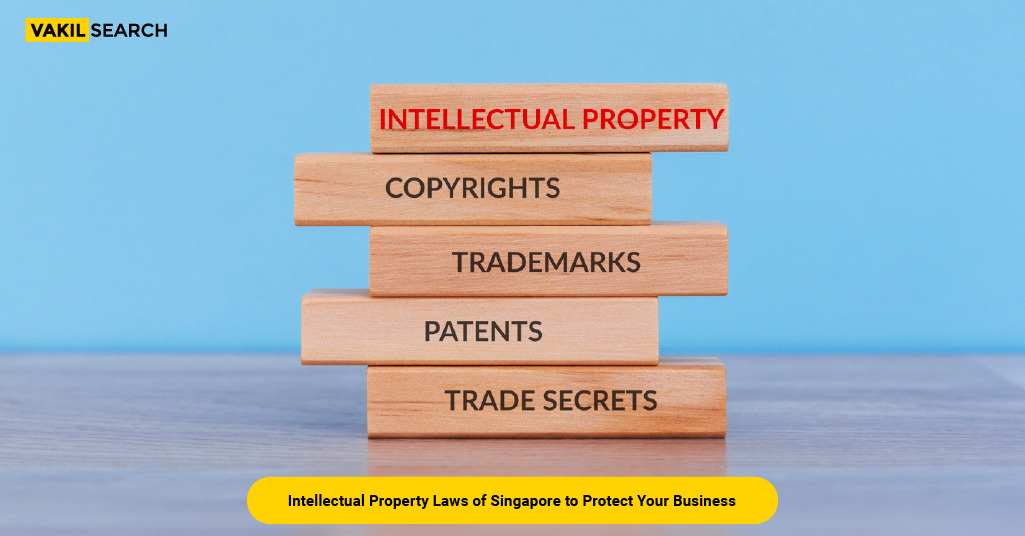Any firm must protect its intellectual property, and Singapore has a strong legal system in place to defend owners' rights. We shall examine Singapore's different intellectual property laws at Vakilsearch, including those pertaining to trademarks, copyright, patents, and designs
Understanding the Importance of Intellectual Property Protection
Businesses in Singapore must safeguard their intellectual property (IP) in order to prevent their original ideas and works from being appropriated or utilised without their consent.
Encourages innovation: By offering incentives for companies to invest in R&D, intellectual property protection promotes innovation. Businesses might not be ready to invest in creating new products or technology without sufficient IP protection.
Creates a competitive edge: By enabling businesses to distinguish their goods and services from those of their rivals on the market, IP protection can give them a competitive edge. Having a strong brand and reputation can help businesses grow in terms of both sales and client loyalty.
Enhances the worth of the company: IP protection can boost a company’s value by making it more appealing to investors and prospective buyers. A company with excellent intellectual property protection might attract a higher valuation since its assets are shielded from infringement and it can make money from licencing and royalties.
Legal defence: IP protection offers legal defence against infringement, which can be enforced by court proceedings. This enables firms to file lawsuits against infringers and pursue financial compensation, which may dissuade potential repeat offenders.
What is Trademark Law in Singapore?
The Trade Marks Act, which governs trademark law in Singapore, offers protection for marks that are used to identify one trader’s goods and services from those of another. A trademark that has been registered grants its owner the only right to use the mark in connection with the products or services covered by the registration.
What is Copyright Law in Singapore?
The Copyright Act, which governs copyright law in Singapore, offers protection for original musical, theatrical, and creative works as well as sound recordings, films, and broadcasts. When anything is created, copyright protection automatically applies and there is no need to register. However, registration could be advantageous in proving ownership.
What is Patent Law in Singapore?
The Patents Act, which governs Singapore’s patent law, offers protection for innovative discoveries with potential for industrial use. For a finite time of 20 years, a patent grants the owner the sole authority to stop others from creating, using, or selling the invention without authorisation.
What is Design Law in Singapore?
The Registered Designs Act, which governs design legislation in Singapore, offers protection for brand-new and unique designs used on goods. For a finite time of 15 years, the owner of a registered design has the sole authority to bar anyone from using, producing, or commercially exploiting goods that include the design.
Strategies to Protect Ownership in Singapore
Businesses can think about strategies like registering their trademarks, patents, and designs; putting in place confidentiality agreements and trade secret protection policies; keeping an eye out for potential IP infringement; and pursuing legal action against any infringement to protect the ownership of intellectual property in Singapore. For trademark registration and to know about other IP properties, contact our experts at Vakilsearch and we will be happy to assist you!
FAQs
Conclusion
The duration of protection for trademarks in Singapore is 10 years, renewable indefinitely for successive periods of 10 years each upon payment of the prescribed renewal fees.
Yes, unregistered trademarks can be protected in Singapore under the common law tort of passing off. However, registered trademarks have stronger legal protection and are easier to enforce.
The process for challenging a patent in Singapore involves filing a revocation action with the Intellectual Property Office of Singapore (IPOS) or initiating a court action for the invalidation of the patent. The challenger must provide evidence and reasons for revoking the patent.
No, it is not necessary to register copyright in Singapore, as copyright protection is automatic upon the creation of original works. However, registration can provide additional legal protection and evidence of ownership.
Registered designs in Singapore are protected under the Registered Designs Act and offer stronger legal protection, while unregistered designs are protected under the common law tort of passing off. Registered designs must meet certain criteria and undergo examination before being granted protection, while unregistered designs must be distinctive and have acquired a reputation in the marketplace to be protected. What is the duration of protection for trademarks in Singapore?
Can unregistered trademarks be protected in Singapore?
What is the process for challenging a patent in Singapore?
Is it necessary to register copyright in Singapore?
What is the difference between registered and unregistered designs in Singapore?
Conclusion
Protecting your intellectual property is critical for the success of your business, and understanding the intellectual property laws in Singapore is an essential step. By registering your trademarks, patents, copyrights, and designs, and developing a comprehensive intellectual property strategy, you can safeguard your ownership and prevent potential infringement. To know more, and understand more, seeking expert advice would be great. So, to help you with this, we have got our legal experts at Vakilsearch to assist you!
Read more,










